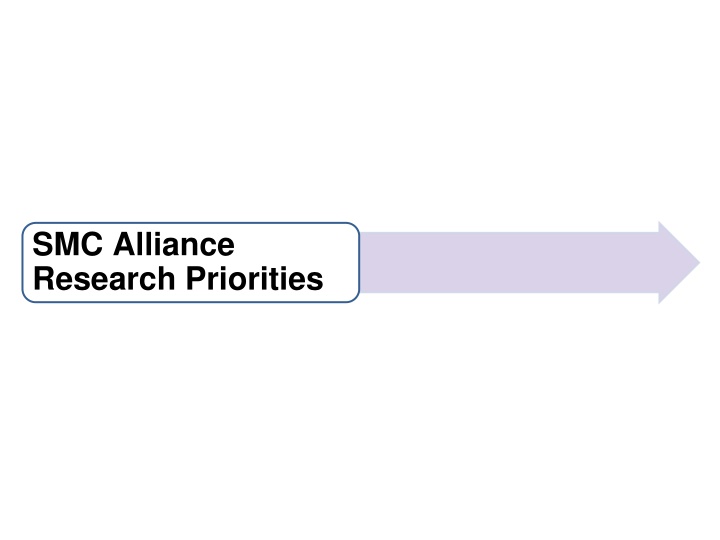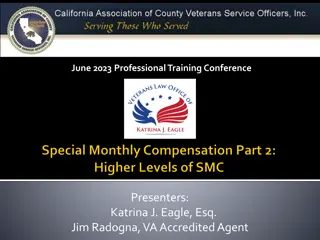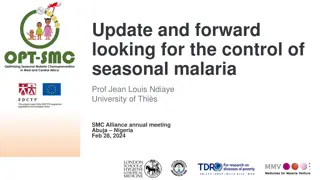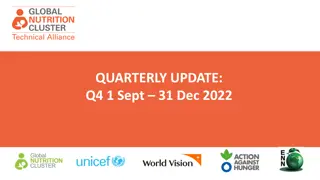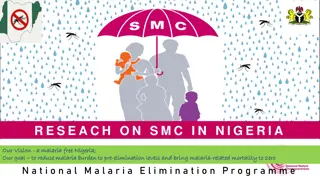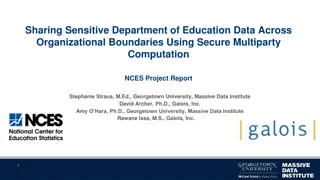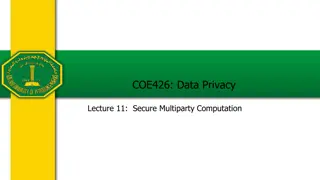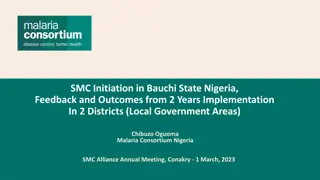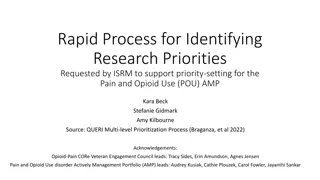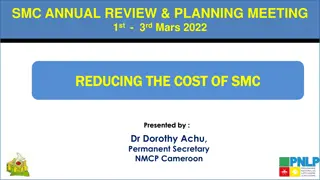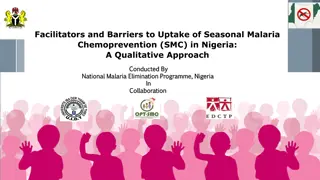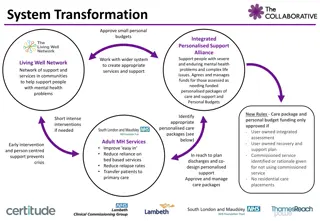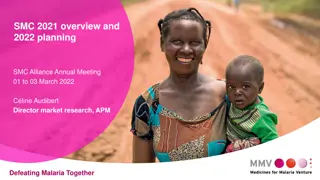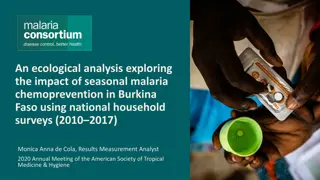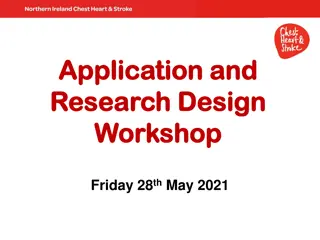SMC Alliance Research Priorities in September 202
Malaria Consortium initiated a project to define future research priorities for SMC. Dr. Sol Richardson, Assistant Professor at Tsinghua University, leads the project aimed at reaching a consensus on medium-term SMC research priorities. The project includes developing a list of top 10 research priorities and analyzing respondents' data based on demographic variables. The eDelphi methodology is employed, consisting of three survey waves conducted online in English or French. The structure of the project is detailed, with research questions covering various topic areas related to SMC operations, drug resistance, safety, community engagement, and more.
Download Presentation

Please find below an Image/Link to download the presentation.
The content on the website is provided AS IS for your information and personal use only. It may not be sold, licensed, or shared on other websites without obtaining consent from the author.If you encounter any issues during the download, it is possible that the publisher has removed the file from their server.
You are allowed to download the files provided on this website for personal or commercial use, subject to the condition that they are used lawfully. All files are the property of their respective owners.
The content on the website is provided AS IS for your information and personal use only. It may not be sold, licensed, or shared on other websites without obtaining consent from the author.
E N D
Presentation Transcript
SMC Alliance Research Priorities
SMC Alliance Research Priorities In September 2022, Malaria Consortium started a project to define future research priorities for SMC Currently being led by Dr Sol Richardson, Assistant Professor of Public Health at Tsinghua University, Beijing
Summary of the project Aim: To reach consensus on a list of medium-term SMC research priorities (over the next 5 to 10 years) Secondary objectives: Develop a list of 10 top research priorities Conduct an analysis of your anonymised data to investigate whether experts' responses differ according to demographic variables such as field of specialty, gender, country of origin, etc.
Summary of the project The survey used the eDelphi methodology A method for identification of a consensus view across subject experts Conducted online to allow the widest range of respondents This study: Consists of three survey waves Surveys and responses in English or French Including questions on participant demographics, ratings of research questions, and open fields to suggest new questions
Summary of the project structure From Harmsen, A.M.K., Geeraedts, L.M.G., Giannakopoulos, G.F. et al. Protocol of the DENIM study: a Delphi-procedure on the identification of trauma patients in need of care by physician-staffed Mobile Medical Teams in the Netherlands. Scand J Trauma Resusc Emerg Med 23, 15 (2015). https: //doi.org/10.1186/s13049- 015-0089-z
Summary of the project Research questions were rated according to 1) their importance, 2) their feasibility, and 3) the degree to which they have already been answered on a five-point Likert scale Questions covered the following topic areas: 1. Malaria drug resistance 2. SMC operations, governance, procurement and programme management 3. SMC monitoring, evaluation and impact 4. Safety and pharmacovigilance 5. Adaptation of SMC delivery models, SMC protocols/criteria for SMC eligibility; introduction of SMC to new geographies; integration with other interventions 6. Sensitisation and community engagement
Results Wave 1 preliminary feedback report: Sample characteristics 26 responses to the Wave 1 survey to date, 25 with data 9 responses in French and 16 in English 17 male, 8 female 11 worked for NGOs, 10 for universities/research institutions, 4 in government 12 of 25 respondents based in Africa, 13 countries represented
Results Wave 1 preliminary feedback report: Sample characteristics 26 responses to the Wave 1 survey to date, 25 with data 9 responses in French and 16 in English 17 male, 8 female 11 worked for NGOs, 10 for universities/research institutions, 4 in government 12 of 25 respondents based in Africa, 13 countries represented
Results Highest-rated questions (importance scores) Question Mean score 4.33 Evaluate the feasibility and impact of extension of SMC rounds to five cycles in suitable contexts Evaluate the feasibility and impact of extension of SMC to children aged over five years and identify optimal age ranges for SMC eligibility in different settings 4.33 4.36 Evaluate methods to reduce spitting and vomiting of SMC medicines by eligible children Evaluate and compare impact of new/different drug regimens (e.g. Dihydroartemisinin-piperaquine) on development of drug resistance 4.38 Evaluate the degree to which eligible children in different transmission settings (i.e. according to seasonality and attack rate) benefit from SMC programs; evaluate differential impact in different settings 4.38
Results Lowest-rated questions (importance scores) Question Mean score 2.83 Design and evaluate policies or interventions to improve motivation and retention of SMC distributors 3.2 Evaluate delivery of SMC through home visits at different times of day on SMC outcomes 3.25 Describe the effects of introduction of SMC on national and local political decisionmaking Evaluate effects of different types of emotive content in sensitisation communications to promote knowledge and awareness of SMC 3.3 3.33 importance_evaluate methods for increasing gender balance of SMC distributors
Results Lowest-rated questions (feasibility scores) Question Mean score Monitor corruption in SMC governance and misappropriation of SMC resources, and identify and evaluate appropriate strategies to minimize corruption 3.50 Investigate at what point should SMC be replaced by targeted or focal mass drug administration (MDA) or other intervention? 3.58 Azithromycin (AZ) is an effective chemoprotective agent in malaria, and reduces the incidence of respiratory tract infections and diarrhea; investigate the risk of bacterial resistance development with more widespread use of AZ 3.58 Identify policies or messaging to promote effective market shaping to ensure sufficient supply of SMC medicines, promote competition among supplier and reduce programme costs 3.58 Investigate the number of SMC rounds (years) after which SMC with SP+AQ becomes less viable due to development of antimalaria resistance in falciparum parasites and reduction in protective efficacy of the intervention 3.81
Results Examples of new questions suggested Question Impact of using different drugs selecting resistance in opposite direction for case management and chemoprevention Develop standardized qualitative research tools to understand challenges identified in LQAS surveys Are there any issues related to the underdosing of overage children mistakenly treated? Potential negative impact of introducing SMC in countries with PMC Sustainable strategies for digitising SMC campaigns; multi-campaign use of digital tools Male partner involvement on acceptability of SMC medicines among rural and urban communities
Discussion Two questions were particularly polarizing in terms of importance ratings, with both a wide range of scores and a significant difference in responses by country of residence and survey language Evaluate logistical challenges faced by SMC campaigns, and identify and evaluate strategies to overcome these logistical challenges Evaluate delivery of SMC through home visits at different times of day on SMC outcomes
Discussion Next steps Update outcome data based on any new responses Compile a list of new questions based on expert suggestions, for inclusion in Wave 2 for rating on their importance and feasibility Eliminate research questions from the Wave 1 survey which were rated either low on importance or feasibility for Wave 2 (which will be a shorter survey) based on % of respondents giving scores of 4 or 5 (e.g. important or very important) Conduct analyses to test whether responses differed by participant characteristics (e.g. did respondents in Africa give different ratings to other respondents?)
Discussion Next steps Eliminate research questions from the Wave 1 survey which were rated either low on importance or feasibility for Wave 2 (which will be a shorter survey) based on % of respondents giving scores of 4 or 5 (e.g. important or very important) Build the Wave 2 online questionnaire by mid-March Discussion of the full Wave 1 results at the next SMC Alliance Research Sub-Committee monthly meeting, including polarizing questions.
Discussion Next steps In Wave 3, further eliminate questions to reach consensus on a top 10 medium-term research priorities
Discussion You can complete the survey on a computer or mobile device. Most respondents take around 20 minutes to complete the survey, but some can spend significantly more or less than that depending on how detailed you want your responses to be. The survey links, in English and French, are below: English: https://malariacons.surveycto.com/collect/edelphi_study_survey_wave_1?ca seid= French: https://malariacons.surveycto.com/collect/edelphi_study_survey_wave_1_fre nch?caseid=
